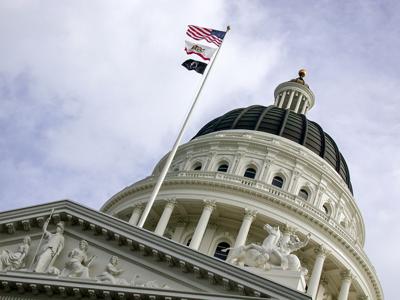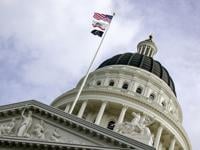
California State Capitol, Sacramento
California business advocates say they are welcoming the decision by California Democratic state lawmakers to pause, for now, legislation they say would have reneged on a deal business groups had struck just last year with Democrats to reform a controversial state law that critics said for decades has made California employers easy targets for alleged "shakedown lawsuits."
This spring, the California Chamber of Commerce and other state business groups had sounded the alarm about the move by left-wing Democrats in Sacramento to push through the legislation.
Known as Senate Bill 310, and championed by State Sen. Scott Wiener, D-San Francisco, the legislation would have greatly expanded the ability of California workers to sue their employers for alleged violations of California state labor law and collect any penalties paid by the employers for themselves.
Specifically, SB310 would create a so-called right of private action, for the first time allowing employees and their lawyers to sue employers directly for alleged violations of state labor laws.
To this point, employees in California have been allowed to sue employers for violations of wage laws and other labor codes, but only through the law known as the Private Attorney General Act (PAGA.) Under PAGA, employees and their lawyers essentially step into court in place of state labor regulators and only behalf of their coworkers who were allegedly harmed.
However, through the decades, a cottage industry of plaintiffs' lawyers has arisen in California, pressing a growing onslaught of PAGA lawsuits against employers for often small or merely technical violations of the law.
A report from the American Tort Reform Association, for instance, showed that PAGA lawsuits had increased 273% from 2011-2022.
Published reports, however, have indicated the lawsuits may have done little more than generate big - and relatively easy - paydays for lawyers.
A report authored by former top California state labor officials for the firm of Baker & Welsh showed PAGA lawsuits forced California employers to pay more than $10 billion to end PAGA lawsuits since 2013.
The bulk of penalties paid under PAGA, to this point, have gone to the state of California, as employees have technically sued in the name of the state. However, their lawyers have received the largest portion of the settlements once the state took its share of the penalties, the report indicated.
Faced with a growing, crushing burden from the PAGA lawsuits, business groups in 2024 placed a referendum on the ballot which would have rewritten PAGA to end the law's so-called "lawsuit first approach." Instead, it would have required more funding for the state Labor Commissioner office and eliminate the "right of private action" under PAGA.
Polls showed the measure would have likely resulted in a big win for business groups and a big loss for California Democrats, with as many as 72% of voters saying they could support the ballot measure.
The reforms revised the PAGA law to:
Allow employees to receive 35% of all penalties paid by employers, rather than the current 25%;
Require plaintiffs to show they personally experienced the alleged violations of California labor law within the preceding year. Currently, they don't need to show they were actually harmed and there is no time limit on the lawsuits;
Cap penalties for employers who take steps to remedy the problems before they are sued at 15% of the applicable penalties, and at 30%, if they move to fix the problems after they are sued;
Gives employers - and small employers, particularly - greater opportunities to "cure" the violations through the state labor department to avoid unnecessary lawsuits;
Heightens penalties for employers who "acted maliciously, fraudulently, or oppressively;" and
Expressly grants greater discretion to judges to "limit both the scope of claims and evidence presented at trial.
The reform measures were enacted into law in 2024.
However, in early 2025, Wiener introduced SB310.
Wiener and other supporters of the measure say it was needed to enable California workers to have a "viable way under California law to recover penalties for late or stolen wages."
“SB 310 is a commonsense measure that simply allows workers to recover both their back wages and statutory penalties for late or stolen wages," Wiener said.
The California Chamber and other members of the PAGA reform coalition, however, said SB310 amounted to a quick move by Democrats to undermine the very reforms they had approved just months earlier and renege on their deal.
After state senators advanced SB310 to the full Senate for a potential vote, the member organizations within the FixPAGA Coalition described the move on May 23 as a "stunning about-face from the 2024 laws designed to curb litigation abuse" and warned the legislation would result in a "flurry of frivolous lawsuits."
“Last spring, the Legislature passed two bills that enacted a vital reform of the Private Attorneys General Act (PAGA), a 2004 law that had done less to benefit California workers than enrich trial attorneys at the expense of business owners and their families," the FixPAGA groups said in a statement in late May.
“Governor Newsom’s signature on those bills led to supporters of PAGA reform withdrawing their ballot initiative, a comprehensive proposal that was supported by hundreds of thousands of California voters demanding change. The bill package was supported by the business community and labor unions, and secured unanimous votes in both houses.
“Today, the California Senate made it seem as though that agreement was written with invisible ink."
However, on June 5, before the Senate could vote on the measure, Weiner paused the legislation, moving it to the Senate's so-called "inactive file."
Following that move, Wiener said he still intended to move ahead with the legislation in coming months, condemning the opposition to SB310 as a "misinformation campaign."
The claims that the bill would undermine the PAGA reforms were "baseless," Wiener said, but noted "the scale and endless repetition of this misinformation undermined the bill's passage."
Weiner said the legislation would "be paused until next January for further work."
With the legislation now paused, though, the FixPAGA coalition thanked others in the California state legislature for listening to the concerns of the state's employers and businesses that drive the state's economy.
“Government works best when important issues are addressed through substantive, good-faith negotiations," FixPAGA members said in a joint statement.
“That’s what took place in 2024, when a sweeping agreement provided a lifeline to California business owners drowning in a sea of frivolous workplace lawsuits. Workers benefited, too, with a faster and better way to resolve their claims.
“These were important, thoughtful modifications to the state’s (PAGA), changes that will mark their first anniversary in less than a month.
“On Thursday (June 5), the state Senate confirmed the agreement remains strong by choosing to not take action on Senate Bill 310.”
The FixPAGA coalition included the California Restaurant Association, California Chamber of Commerce, the California New Car Dealers Association, the Western Growers Association and the California Retailers Association.



